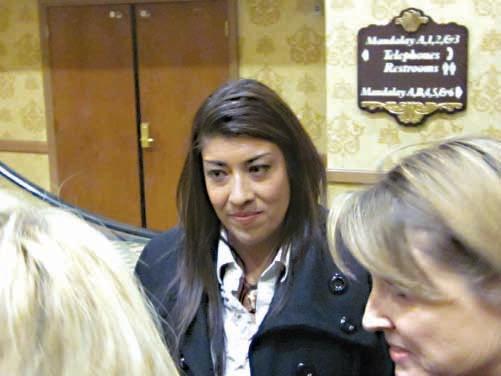
10 minute read
News
from July 31, 2014
Sorting it out
On July 22, media outlets began reporting that the Washoe County School Board had fired schools superintendent Pedro Martinez.
Advertisement
That was not what the school board had said. In a prepared statement it used a different phrase—“relieved of his duties.” This term usually refers to a step short of termination, as when Nevada Highway Patrol chief David Hosmer was relieved of duty in 2006 while an inquiry into his conduct was conducted. In addition, if the school board intended to say termination, it presumably would have used that term.
On the morning of July 23, the RN&R, our interest piqued by the wording, made some calls and by noon felt certain that Martinez was still on the district payroll. We posted a report on our Newsview blog at 12:38 p.m.: “Sources tell the Reno New & Review that Washoe schools superintendent Pedro Martinez has not been fired, but has been placed on paid administrative leave. They say no vote was taken last night. Rather, the board acted by consensus without a vote, whatever that means.” School district lawyer Randy Drake told us he would be putting out a statement shortly to clarify what had happened the night before. (He never did.)
As the afternoon wore on, the firing story kept gaining ground. KOLO, KTVN, KRNV, and the Reno Gazette-Journal all posted stories repeating that Martinez had been fired. Finally school board chair Barbara Clark said that he had not been, and that he was on paid leave. The Reno Gazette-Journal put that story online at 4:50. Meanwhile, Martinez was trying to gather support and giving interviews. At 6:38 that evening, a KTVN story on one of those interviews went up, and it still used the term “firing” more than an hour after Clark had spoken.
After Clark’s statement, Martinez kept insisting he’d been fired. But he had no way of knowing what action the board took because, he himself had said, he was asked to leave the room while the board took action. (“Took action” is a term used MARTINEZ advisedly. Some sources say no vote was taken either in open or closed session.) Clark, not Martinez, was the authority on what had been done. But some media entities seemed reluctant to let go of the firing story or were uncomfortable admitting they had gone beyond the school board’s original statement.
On July 24, some outlets were still treating the matter as a firing. One fortunate newspaper was the Sparks Tribune. Its publication schedule meant its next edition was after Clark’s statement, so from the start it reported paid leave instead of a firing. But the Gazette-Journal continued to use terms like “removal” and even challenged the notion of paid leave in an editorial on the ground that school board chair Barbara Clark had spoken of preparations for seeking a replacement—which, however, would have been a normal precaution even if Martinez had only been put on leave. (Hosmer ended up leaving his post.) As late as July 29, the RGJ was still referring to the board’s “attempt to dismiss.”
A school district spokesperson said school board minutes “take several months to get approved.” These minutes may have to be hurried up this time, given the level of interest in them and the open meeting complaint filed by the RGJ. If they show the board did not vote, then not only was Martinez not fired, he wasn’t put on leave, either. In that case, he is still superintendent of schools with full authority. The board cannot act without taking a vote. One source said another vote was planned to cover that eventuality, but an agenda item for its upcoming July 29 meeting that could have been used for that purpose has been withdrawn. If the board did not vote, that may reduce some of its open meeting problems.
Why did the board’s original statement say Martinez had been relieved of his duties but not that he was on paid leave? According to some sources, that was done at his insistence. Why didn’t the board correct the record more quickly? Harder to say. —Dennis Myers
The abortion candidate?
Single issue threatens to consume Flores candidacy
Democratic lieutenant governor nominee Lucy Flores likes to talk about education, by economic development, tourism, Dennis Myers health care. But what bewitches those who cover her campaign is the fact that she had an abortion. “Finally, a Politician Admits to Having an Abortion Simply Because She Wasn’t Ready for a Baby” was the headline on a July 14 Slate piece by Brooklyn writer Amanda Marcotte. At the Weekly Standard, it’s “Politician Talks Up Her Abortion on Campaign Trail” over a July 8 article by Daniel Halper.
Fred Lokken Political analyst
Salon’s July 8 article by Katie McDonough didn’t get it into the headline (“The left’s new hero emerges: Why Lucy Flores’ candid advocacy is so important”) but that’s what its story was about: “When any woman shares her abortion story, she creates space for others to do the same.”
Flores described her experience with abortion on April 1 last year in Assembly Education Committee testimony supporting changes in sex education law. She described being raised in adolescence by a single father after her mother left the household. There was nothing like sex education in their home, she said, and all of her sisters, she said, had become pregnant before her.
“One was 14 years old when she got pregnant with twins,” she said. “That is what I had to learn from. ... I always said that I was the only one who didn’t have kids in their teen-aged years. That’s because at 16, I got an abortion, and it was a very difficult thing for me to do.”
She approached her father for help in obtaining the abortion, she said.
“I wanted to do better and I knew I couldn’t do that if I had a baby, just like everyone else [in the family]. My dad gave me the money, and I went with a friend of mine, and I will never forget that, having that done. … And so how do we prevent this? We prevent by education. We prevent by giving them the information and the resources that they need, so they don’t have to go to their dad and say, ‘I need $200 for an abortion.’”
After that teen experience, Flores went on to get a general equivalency high school diploma, graduated from the University of Southern California and then law school. She is now in her second term in the Nevada Assembly.
While the Weekly Standard says she “talks up” the experience
Lucy Flores was candid in legislative testimony, and she now may be paying a price.
on the campaign trail, she has not. The word abortion does not appear on her website, certainly not on the page devoted to issues. It features an MSNBC story on her, but ends the text before it reaches the portion that mentions the abortion. And Flores seems aware that the matter could overwhelm her other messages, because far from talking it up, her staff is discouraging it. When the RN&R sought an interview with her on the subject on July 23, we were told she was busy the rest of the day. When we asked about July 24, we were told she was “booked solid” that day too, and also “through the weekend. She’s spoken at length publicly about this issue. Sorry we can’t accommodate you on this occasion but do let us know if you have other topics you would like to cover in future.”
Rather, it appears that it’s reporters who are more preoccupied by Flores’ year-old committee testimony. And some of them want to see it spun in certain ways as it plays out during the campaign. McDonough at Salon objects to the way the abortion issue is incessantly filtered through the lens of opponents.
“If more women like Flores started coming out with their own experiences about abortion care—how far they had to drive to reach a clinic, how much it cost them, the protesters they confronted on their way, their experience with the doctors and clinic staff—it would demystify the experience for the many Americans who are getting their information about reproductive healthcare from caveman fools like Lindsey Graham and Rick Perry,” McDonough wrote. “We’re long overdue for some common sense and reality checking in our debates about reproductive health care. Lucy Flores was willing to step up. Who’s next?”
A lot of the national coverage may be affected by a lack of understanding of the Nevada view of the abortion issue.
“I think that in Nevada the abortion issue is not as emotional as it is elsewhere,” said political analyst Fred Lokken.
Nevadans voted on the issue in a 1990 referendum and approved the state’s Roe-style abortion law in a landslide, 71.3 to 27.2 percent. That more or less removed it from politics and made it difficult to raise the issue against candidates who support abortion.
“I see it as a very settled issue in Nevada, more so than in other states,” Lokken said. “It would only be some portion of the right in the Republican party that is brooding on it.”
Word choice

Lokken said he thinks the Flores staff is falling down on the job by not giving reporters something else to cover. “They should be artificially creating stories that turn reporters’ attention somewhere else,” he said. “Her staff should really get off the dime.” But that’s not easy to do with the national reporters. To them, Flores’ abortion story is new and unusual, and they’re not likely to be diverted by her stands on Nevada economic development.
Lokken said he thinks Flores will get credit with some voters for candor. But in practical campaign terms, he said, the main concern would be fundraising.
“The only thing they have to worry about is whatever affects the money flow and in the Democratic party that’s not likely to happen because of this issue,” he said.
Another problem for Flores is that a lot of the abortion coverage she’s getting is relatively unsophisticated, akin to what it would have been like 20 or 30 years ago. Abortion is not the novelty it once was. And some writers use it to define candidates’ overall political stances. Flores is a pro-business attorney with a middleof-the-road voting record, yet Salon characterized her as the “left’s new hero” solely based on a single issue.
One indication of the way Flores is at the mercy of the way some reporters cover the abortion issue is in the use of a particular term in much of the coverage of her experience.
In a July 16 Huffington Post piece by Ryan Buxton, the lead sentence was, “Lucy Flores, an assemblywoman in Nevada and candidate in the state’s lieutenant governor race, made a splash when she admitted to having an abortion at the age of 16 during a debate about sex education” (emphasis added).
But abortion is legal. What about her statement makes it an admission? When was the last time a politician was described as “admitting” to being married or owning a business?
Lokken read that sentence at our request and responded by email, “The reporter’s personal bias—or political slant—on the issue of abortion clearly affected the selection of ‘admitted,’ as though the candidate was confessing to something. The judgment-free appropriate word should/would have been ‘acknowledged’ or ‘indicated’ or ‘said.’ The intent by the candidate likely was to confirm through her own personal experience that she fully understood what a woman goes through in making the decision to have an abortion.”
“It clearly should be ‘said’,” agreed (or admitted) Jake Highton, author of the McGraw-Hill textbook Reporter.
Slate, Huffington Post, the New York Daily News, MSNBC, and innumerable minor online sites have used “admit” or a variant to describe the statement Flores made disclosing her abortion. Interestingly, Catholic Online is not one of them—not even in its reader comments. Ω
Hold that emergency


Padraig Harrington
THIS WEEKEND JULY 31-AUGUST 3, 2014 The Barracuda Championship is here.
Get up close and personal for all the PGA TOUR action, and don’t miss exciting events including the Mirassou Wine Walk, Food Truck Stop and the brand new Coors Light 19th Hole After Party featuring live entertainment and unbeatable drink specials.
GET YOUR TICKETS TODAY!
775.322.3900 • BarracudaChampionship.com
Here’s something not often seen—an ambulance, lights and siren on, stopped cold by the crush of traffic. There are two vehicles immediately in front of the ambulance blocking its way. Those vehicles could not go left because Maple Street is one-way. They could not go straight both because of a red light and because of oncoming traffic (that school bus, for instance). They could not go right because it’s an illegal turn and because the cars to their right might start moving at any time. Fortunately, the hold-up was short—the light changed as this shot was snapped.










